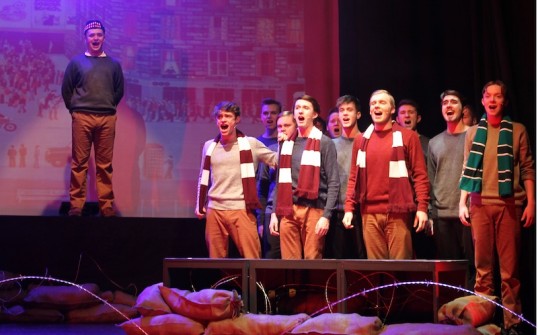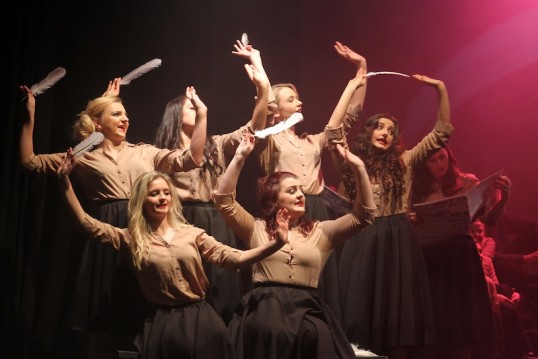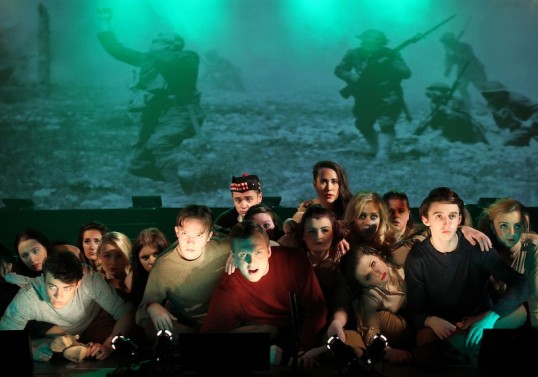Farewell My Son
✭✭✭✩✩ Poignant and promising
Church Hill Theatre: Wed 26 – Fri 28 Nov 2014
Full of local relevance and commemorating the 100th anniversary of the events it depicts, Farewell My Son has some moments of emotional power.
The story of ‘McCrae’s Battalion’, the 16th Royal Scots, who were formed in 1914 largely from footballers and fans, has been rescued from relative obscurity in the last few years. It was always known to many fans of Heart of Midlothian as it was the Hearts squad, regarded as one of the club’s greatest, which kickstarted the recruitment by signing up to the battalion en masse, but in recent years it has become more widely known.
Jack Alexander’s book on the subject was instrumental in this, but recently the tale has been the subject of various works ranging from James Kilgore’s children’s novel Soldier’s Game to the recent BBC online drama Footballers United.
And now there is Steve Potter’s ambitious musical, staged by Potter’s Matchbox Musical Theatre and the MGA Academy. While McCrae himself features heavily, there are no footballers portrayed; instead the story deals with four supporters (three Hearts, one Hibs) who join up, and leave their wives and sweethearts at home.
These four recruits are amiably played, but the characters are not sufficiently differentiated for it to be clear why they are all dramatically necessary. Jack King (Nixon) and Jack Douglas (Sandy) both carry off the naïveté and cheek of youth, but unsurprisingly struggle to convey the older, sadder casualties of war. Connor McKay’s Wullie has a little more presence, while Thomas Doherty’s Joe lacks nothing in commitment. All four sing well, but limited character development hampers them dramatically.
impressive emotional range
Tom Mullins, meanwhile, shows an impressive emotional range as McCrae, but does not quite have the gravitas to mark him out as a much older man.
The chance to show the dramatic effect the war had on women’s role in society is sadly not taken. There are several female roles of significant size, but if they are not pining for their menfolk, they are threatening them with frying pans – unless they are skimpily dressed prostitutes.
This is unfortunate when these parts are played by such capable performers. Rachel Dickson, Laurie Coburn and Rachel McPhail impress as the women left behind, with Dickson in particular outstanding. The musical numbers featuring them, particularly No Matter What He Says and Don’t Be Away Too Long, are the show’s highlights.
Rachel Crone’s Paperseller, a cleverly conceived narrator figure, is also impressive, while Amy Johnston invests the role of McCrae’s wife with real emotion.
On the whole, the slower songs work better, but the music is of a consistently high standard and well sung throughout. The lyrics are not always as impressive, and attempts at humour fall flat, but the score of what is an entirely sung through musical is largely successful.
Technically, the production is of a high standard. Director Andrew Gowland has ensured the cast are well drilled and the singing clear. The lighting is accomplished, and the use of projection is apposite and informative without intruding. The first act in particular rattles along, thanks in no small part to Neil Metcalfe’s tireless keyboard accompaniment.
However, the darker tones of the second act are not handled very subtly. The most successful attempt to depict the horrors of war, Everything Has Changed, is oddly placed in the first act. The second half then loses its way to a large extent, as the story is unable to stand up to the weight of the terrible events it depicts, instead settling for titillation or uneasy sentimentality.
The depiction of the Somme, when it comes, is simple and effective. It makes clever use of a slowed down version of the first half’s uptempo closer It’s A Funny Thing This War, now turned into a poignant and horribly ironic lament, accompanied by some heartbreakingly simple staging. This redeems most of the failings of the previous thirty minutes, but is then followed by an unnecessary coda, which comes after the audience (with good reason) believe the performance to be over. The removal of this epilogue would make for much more dramatically and emotionally satisfying finale.
Overall, there is enough emotional impact in the show for it to be a success in Edinburgh. There might need to be some tweaks for it to have a wider appeal, but there is a great deal of promise on show.
Running time 2 hours 5 minutes including interval
Church Hill Theatre, 33 Morningside Road, EH10 4DR
Wednesday 26 – Friday 28 November 2014
Evenings 7.30 pm
Information at www.themgaacademy.com/farewell-my-son
ENDS





















Comments (1)
Trackback URL | Comments RSS Feed
Sites That Link to this Post